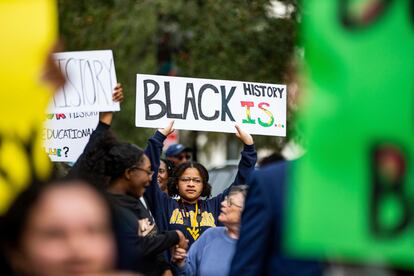Changes planned for College Board’s Black history class
Critics said the agency bowed to political pressure and removed several topics from the framework, including the Black Lives Matter and slavery reparations movements

After facing criticism for removing topics including the Black Lives Matter and slavery reparations movements, the College Board announced it will be making changes to its new Advanced Placement African American studies course.
The company did not say what the changes will be or when they will be made public. In a statement Monday, it said a development committee and experts charged with developing the course will “determine the details of those changes” over the next few months.
“We are committed to providing an unflinching encounter with the facts and evidence of African American history and culture,” the company said.
The course gained national attention this winter when Florida Governor Ron DeSantis, a possible Republican presidential candidate in 2024, said he would ban the course in his state because he believed it pushed a political agenda.
“In the state of Florida, our education standards not only don’t prevent, but they require teaching Black history, all the important things. That’s part of our core curriculum,” DeSantis previously said. “We want education and not indoctrination.”
But the official curriculum for the course, released after DeSantis’ administration rejected it, downplayed some components that had drawn objections from the governor and other conservatives. The College Board faced an onslaught of criticism from activists and African American scholars who were outraged that the course changed because of political controversy.
Critics said the College Board bowed to political pressure by removing topics including reparations and Black queer studies.
David Johns, executive director of the National Black Justice Coalition, said he interpreted the College Board’s announcement Monday as an admission that it had watered down the course.
“We must remain vigilant to ensure that all students have access to an education that prepares them for the future by teaching them the uncensored and full history of the United States,” Johns said. “We cannot, and will not, let the politics of fear and division dictate what our children are taught.”
The course was launched in 60 schools and will be expanded this upcoming school year to reach 800 schools with 16,000 students.
The nonprofit testing company previously said revisions to the course were substantially complete and not shaped by political influence before DeSantis shared his objections. College Board officials said developers consulted with professors from more than 200 colleges, including several historically Black institutions, and took input from teachers piloting the class.
The company said Monday that the creation of the course had given access to a discipline not widely available to high schoolers and brought that content to as many students as possible — a possible reference to students in states run by conservatives. “Regrettably,” the nonprofit testing company said, those two goals “came into conflict.”
The College Board offers AP courses across the academic spectrum, including in math, science, social studies, foreign languages and fine arts. The courses are optional and taught at a college level. Students who score high enough on the final exam usually earn course credit at their university.
Sign up for our weekly newsletter to get more English-language news coverage from EL PAÍS USA Edition
Tu suscripción se está usando en otro dispositivo
¿Quieres añadir otro usuario a tu suscripción?
Si continúas leyendo en este dispositivo, no se podrá leer en el otro.
FlechaTu suscripción se está usando en otro dispositivo y solo puedes acceder a EL PAÍS desde un dispositivo a la vez.
Si quieres compartir tu cuenta, cambia tu suscripción a la modalidad Premium, así podrás añadir otro usuario. Cada uno accederá con su propia cuenta de email, lo que os permitirá personalizar vuestra experiencia en EL PAÍS.
¿Tienes una suscripción de empresa? Accede aquí para contratar más cuentas.
En el caso de no saber quién está usando tu cuenta, te recomendamos cambiar tu contraseña aquí.
Si decides continuar compartiendo tu cuenta, este mensaje se mostrará en tu dispositivo y en el de la otra persona que está usando tu cuenta de forma indefinida, afectando a tu experiencia de lectura. Puedes consultar aquí los términos y condiciones de la suscripción digital.








































